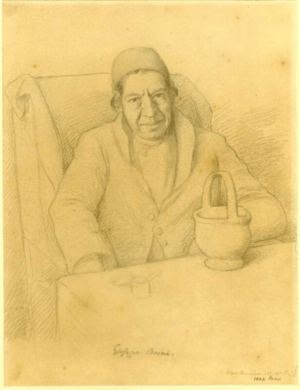Giuseppe Baini facts for kids
Giuseppe Baini (born October 21, 1775 – died May 21, 1844) was an Italian priest, music expert, conductor, and a composer of church music. He was known for his important writings about music history.
Contents
Early Life and Musical Talent
Giuseppe Baini was born in Rome, Italy. He learned how to compose music from his uncle, Lorenzo Baini. Later, he also studied with another teacher named G. Jannaconi.
Baini had a very strong and deep bass voice. Because of his amazing voice, he joined the famous Sistine Chapel Choir in 1802. This choir sings for the Pope in Vatican City.
A Talented Composer
In 1814, Giuseppe Baini became the musical director for the Pope's chapel choir. This was a very important job. He wrote many pieces of church music. Most of his music was in a serious and traditional style.
One of his most famous pieces is a ten-part "Miserere." He wrote this for Pope Pius VII in 1821. This special song is still used in services at the Sistine chapel during a time called Passion Week.
Music Historian and Critic
Giuseppe Baini was even more famous as a music historian and critic than as a composer. He loved to study and write about music from the past. His most important book was about the life and works of a famous composer named Palestrina. The book was called Memorie storico-critiche della vita e delle opere di Giovanni Pierluigi da Palestrina and was published in 1828.
This book was considered one of the best of its kind. Baini's book helped make Palestrina known as "Il Principe della Musica," which means "The Prince of Music."
Influence on Music History
Baini's book on Palestrina was very important. It helped people in the 1800s understand and appreciate Renaissance music much more. The book made Palestrina seem like a hero who saved church music.
Even though some of Baini's ideas about Palestrina were later found to be a bit exaggerated, his book was still very influential. It brought a lot of attention back to the beautiful music of the Renaissance period.
Later Life
Giuseppe Baini passed away in May 1844 in Rome, the city where he was born.
 | Claudette Colvin |
 | Myrlie Evers-Williams |
 | Alberta Odell Jones |


